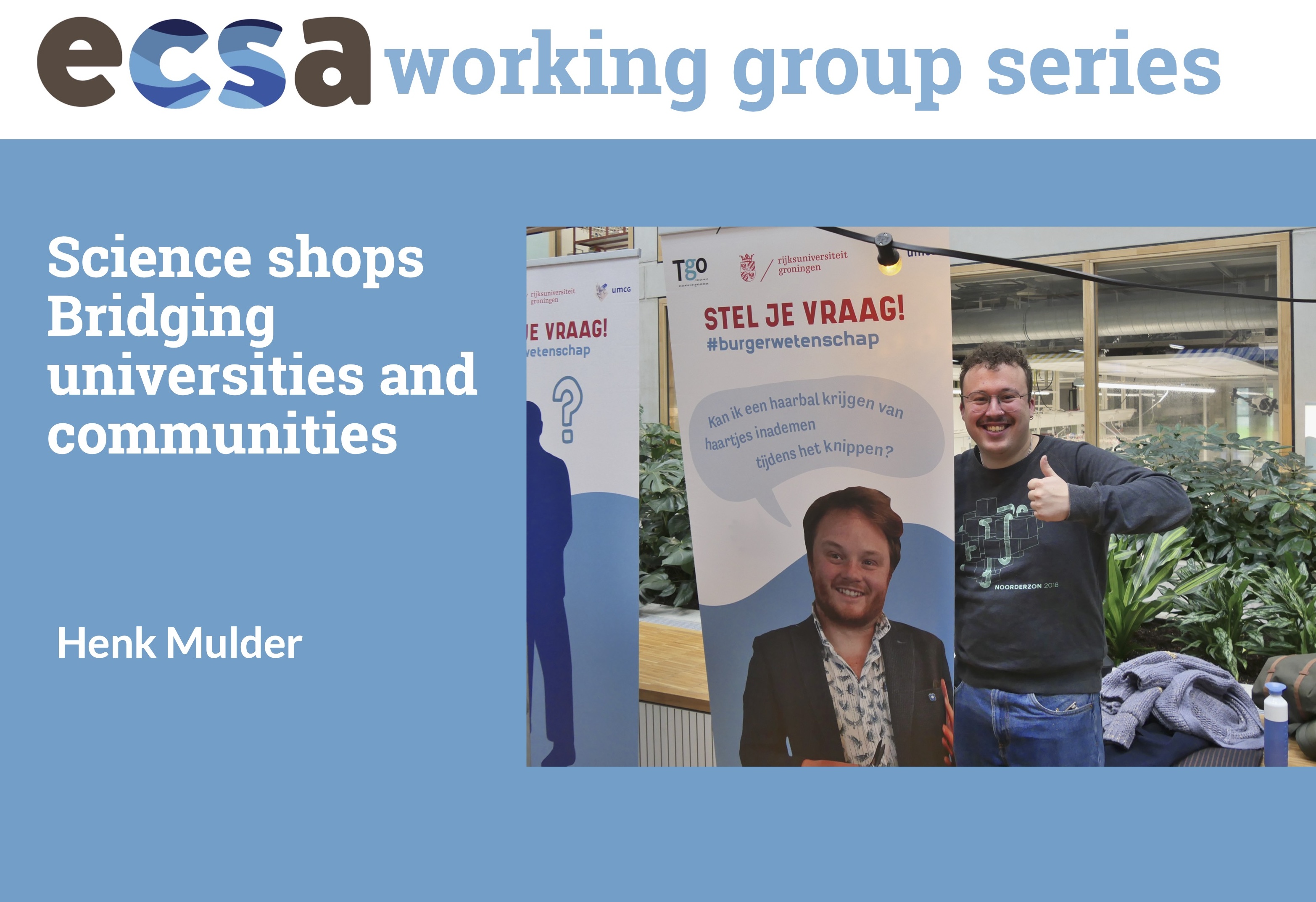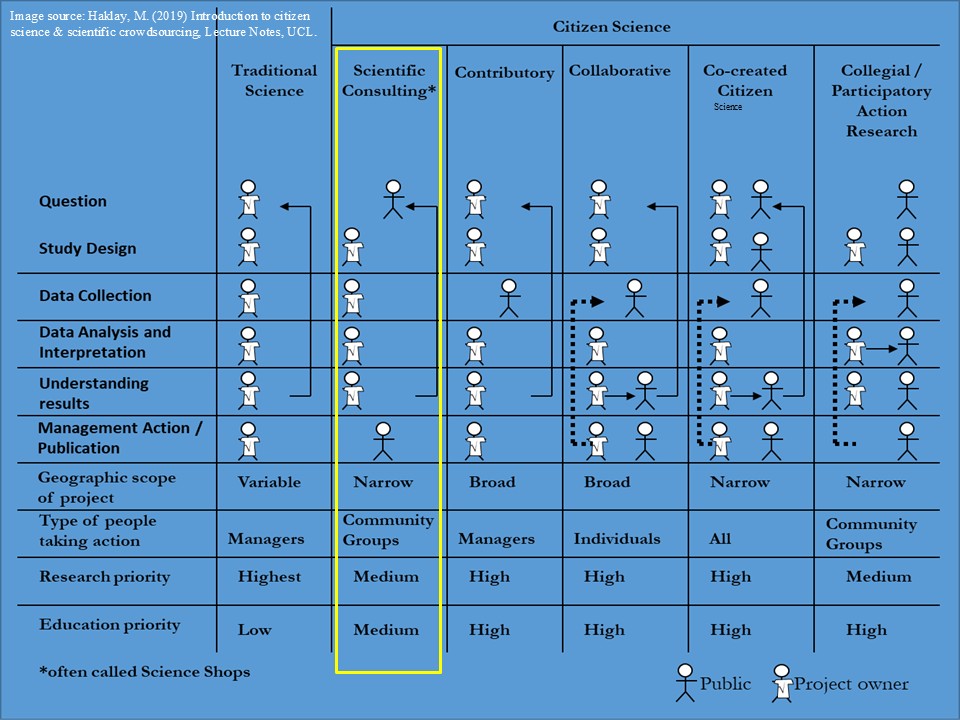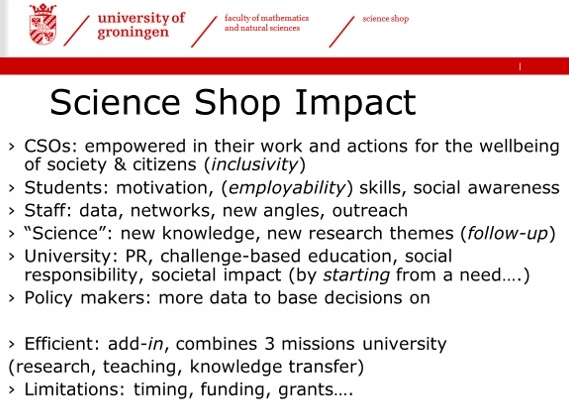
Science shops - Bridging universities and communities
Henk Mulder
May 6, 2025, 12:36 p.m.
How can universities foster meaningful engagement with society? One approach is through Science shops—university-based initiatives that connect researchers with civil society organisations to address real-world challenges. During a recent meeting of the ECSA Working Group on Citizen Science and universities, participants discussed the role of science shops, why they thrive in academic settings, and how they operate. This blog post summarises key takeaways from the discussion.
What are science shops?
Science shops are outreach offices at research institutions where civil society organisations (CSOs — voluntary organisations that are not part of formal government, such as grassroots community groups, non-profit advocacy and volunteer groups, and nongovernmental organisations) can commission research on issues that are relevant to them. The name “science shop” is a literal translation of the Dutch word wetenschapswinkel. However, it is not a regular shop, and it is not concerned with natural sciences only, but also with social sciences and humanities (in Dutch, both are wetenschap). While “science shop” is the most common term, sometimes other names are used, such as Knowledge point, Community-based research centre, Shopfront, Knowledge co-op, Interchange, and so on.
The best definition of a science shop is the one provided by the Living Knowledge International Science Shop network, which defines it as an organisation that “provides independent, participatory research support in response to societal concerns”.
The key principles of a science shop include:
- Independence: Research is conducted with academic integrity, free from commercial or political pressures.
- Participation: Projects incorporate knowledge from CSOs to ensure relevance and applicability.
- Accessibility: Services are provided without financial barriers, ensuring that research is available to groups that might otherwise lack access.
- Societal relevance: Research topics originate from real-world concerns rather than purely academic curiosity or commercial interests.

Table 1. Different forms of Citizen Science [Haklay, 2019]
Muki Haklay describes this as a consultancy-type of citizen science (see table 1). Science shops act as knowledge brokers between the “supply of” and “demand for” scientific knowledge — though the words supply, and demand do not characterise the true relationship and partnerships formed. CSOs engaging with science shops can range from neighbourhood associations, environmental groups, and patient organisations to schools, museums, and even local authorities.
Why science shops in universities?
Universities are natural homes for science shops, providing expertise, resources, and a learning environment where students and researchers can collaborate with civil society. One well-established example is the University of Groningen, which established its Science Shops in 1979 and currently has offices in five faculties (Science and Engineering; University Medical Centre; Pedagogy and Education Studies at the Faculty of Social and Behavioural Sciences; Languages, Communication, Culture at the Arts faculty; Philosophy).
Each faculty funds coordinators who manage the process, integrating the science shop projects into coursework or theses and research projects. The university’s central office funds a chairperson and communications officer to support communication on social media, annual reports, and joint activities. In total, the university has 11 science shop staff sharing responsibilities across 3.5 full-time allocations. Occasionally, additional funding is acquired. About 150 of Groningen’s students (3% of all the students in one year) participate in a science shop project during their studies, contributing to around 100 societal research questions annually.
Universities are ideal hosts for science shops because they integrate research into education. At the University of Groningen science shops, research is often conducted by students for course credit, supervised by faculty, as part of an assignment in an existing course, or as bachelor's or master's thesis project. This aligns with universities' core missions (teaching, education, outreach), keeping costs low. Projects requiring professional researchers and unlikely to result in student learning or academic publications may need external funding.
How Science Shops Work in Practice
Managing a science shop involves a structured yet flexible process to ensure meaningful collaboration between universities and civil society. The coordinators of the science shop follow a 10-step workflow (though in practice these steps are more circular):
- Identify and solicit questions from civil society.
- Refine the research question with the societal partner.
- Conduct preliminary research, leading to a referral, quick advice, or a full project plan.
- Find a supervisor and match the project to a suitable course or thesis/research project. This can require either splitting the question into smaller parts or enlarging it with a theoretical component.
- Recruit students or researchers and secure additional funding if needed.
- Oversee the research process and maintain communication.
- Ensure results are accessible, presenting them in reports, websites, or events.
- Support implementation, helping partners apply findings.
- Identify follow-up opportunities, such as further research or publications.
- Evaluate the process with students, supervisors, and partners.
A kaleidoscope of examples from the University of Groningen
Faculty of Science and Engineering: A doctoral study on wind turbine noise at night disproved official models and, after five years, led to policy changes. Another project, in partnership with a municipality and local groups, helped design wildlife-friendly street lighting.
Philosophy science shop: Philosophy students worked with a regional newspaper to address concerns about algorithm-driven news selection. Another project explored the meaning of diversity for local cultural organisations.
Pedagogy and Education science shop: Schools in small villages examined ways to share their buildings with other community users to offset financial challenges.
Arts faculty science shop: Students helped a municipality improve internal communication about a biodiversity-friendly mowing policy. Another project addressed neighbourhood noise concerns through community collaboration.
University Medical Center science shop: An evaluation helped a nonprofit assess its support services for people recovering from illness. In another project, midwives and students worked together to improve methods for assessing blood loss during bath births.
The broader impact of science shops
Science shops aim to create mutual benefit for all involved, as depicted in Table 2.

Table 2: Science shop impact
Through science shops, CSOs benefit from access to research that would otherwise not be available to them. This allows them to advance their services, products, or policy and can get them public or media attention, legal success, or influence on policy development. Even when policy change isn’t immediate, these collaborations ensure that societal concerns are scientifically investigated, empowering communities and CSOs to fully participate in shaping our society from the bottom up. Simultaneously, for universities, this also brings real benefits.
Cover image: Science shop at the info market